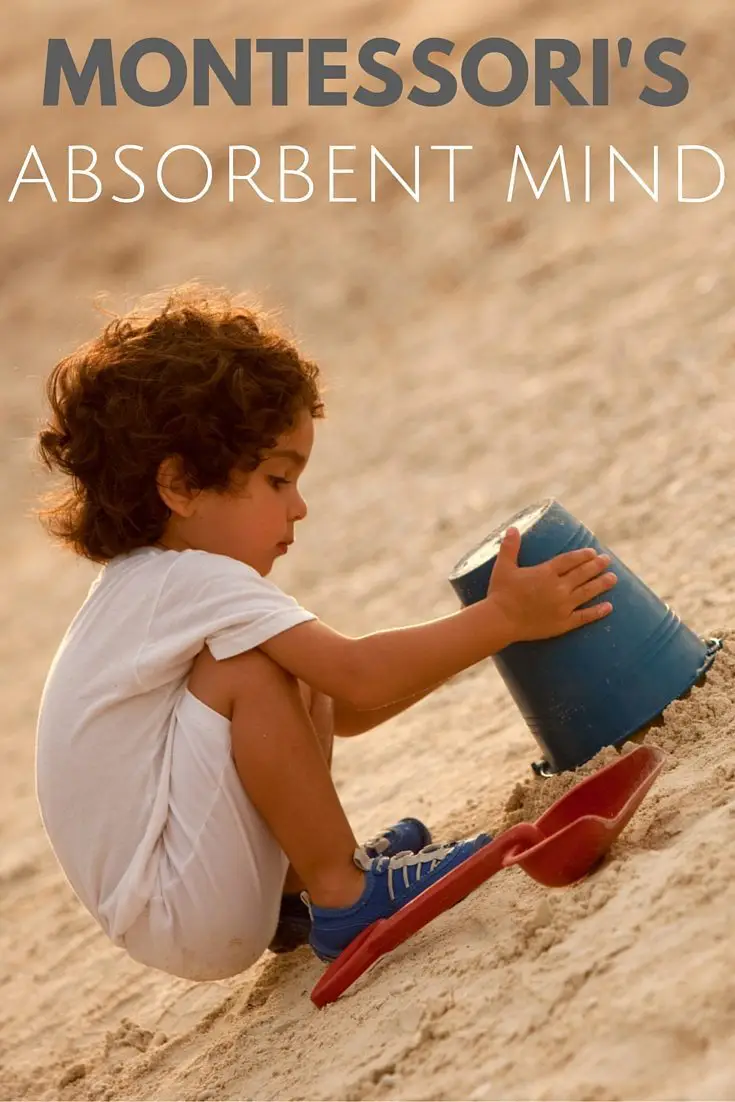Are you a parent or teacher looking for new ways to encourage your children’s learning? Or perhaps you are simply looking to understand Montessori theory better. Regardless, understanding the Absorbent Mind is essential to gaining insight into how humans learn from birth through adulthood as explained by Maria Montessori.
The Absorbent Mind illustrates the concept that humans absorb information naturally and effortlessly at certain stages in their development without any deliberate effort or instruction from an adult – making it one of the foundational principles of finding success with education at home and in school.
Through this post, we will discuss what exactly is the Absorbent Mind, why it matters, and different strategies parents and teachers can use for preschoolers based on this wonderful idea. Let’s dive right in!

Dr. Montessori defined an Absorbent Mind as when a “child is effortlessly assimilating the sensorial stimuli of the environment”
One analogy for this concept: a sponge soaking in everything within the environment. Another analogy: a camera snapping images of everything it sees through the lens.
“The ‘absorbent mind‘ welcomes everything, puts its hope in everything, accepts poverty equally with wealth, adopts any religion and the prejudices and habits of its countrymen, incarnating all in itself. This is the child!”– The Absorbent Mind
What is the Absorbent Mind
According to the American Montessori Society, the Absorbent Mind is: “From birth through approximately age 6, the young child experiences a period of intense mental activity that allows her to “absorb” learning from her environment without conscious effort, naturally and spontaneously.”
A child is born without the ability to speak or to take care of himself but within the first three years of his life through the use of his senses, he gathers the information he needs to develop, to “create and construct” himself. He gathers naturally without thinking.
The Absorbent Mind & Sensitive Periods
“Impressions do not merely enter his mind, they form it, they incarnate themselves in him.” – The Absorbent Mind
Montessori broke the Absorbent Mind down into two phases: 1) the unconscious (from 0-3 years old) and 2) the conscious (from 3-6 years old).
Unconscious & Conscious Phases
During the 0-3 year period, the child unknowingly gathers impressions from his environment, begins to develop the “self-concept” and life skills, such as independence.
Once he enters the latter period of development, the child is consciously taking in his environment, not with new impressions but seeking ways to give order to or to create a system for, those impressions gathered unconsciously during the prior period of development.
Movement and liberty are big inner drivers at this time. This is the “let me do it by myself” stage and us adults should allow that to happen. The Absorbent Mind fades as he reaches six years of age.
Montessori’s Sensitive Periods
Within that concept of the Absorbent Mind, she defined Sensitive Periods of Development.
“Sensitive periods describe the pattern the child follows in gaining knowledge of his environment while Absorbent Mind explains the quality and process by which he gathers this knowledge.” {Montessori: A Modern Approach, pg. 36)
Sensitive periods are “blocks of time in a child’s life when he is absorbed with one characteristic of his environment to the exclusion of all others”.
Related Read: Learn the Advantages of a Multi-Age Classroom
E.M. Standing writes, “Montessori observed sensitive periods in the child’s need for order in the environment, the use of the hand and tongue, the development of walking, a fascination with minute details objects, and a time of intense social interest.”
Montessori’s background in biology lends to very effective analogies to these periods in a child’s life. A young butterfly lays eggs on a leaf, where tiny caterpillars hatch and with a keen sensitivity to light seeks out the softest leaves to nourish themselves in dangerous spots on plants.
Once the caterpillars grow and are strong enough to eat tougher leaves, this sensitivity to light disappears. Another analogy is a searchlight (coming from the mind) illuminating only certain parts of the environment.
Like creatures in science, the child will show an intense interest in a certain activity and be driven to repeat the activity again and again for no reason but to satisfy an inner urge to make contact with and then to make sense of his world.
Related Read: Montessori Kindergarten – Yay or Nay?
The dire aspect of this point lies in the belief that once a child leaves a sensitive period, the opportunity for a “natural consequence” is lost and further development will be impeded. {Montessori: A Modern Approach, pg. 25 & 32)
So, as soon as adults witness a child entering a certain sensitive period, the adult must do all possible within their power to cater to the child’s development.
Related Reads
Thanks for reading.
Marnie
